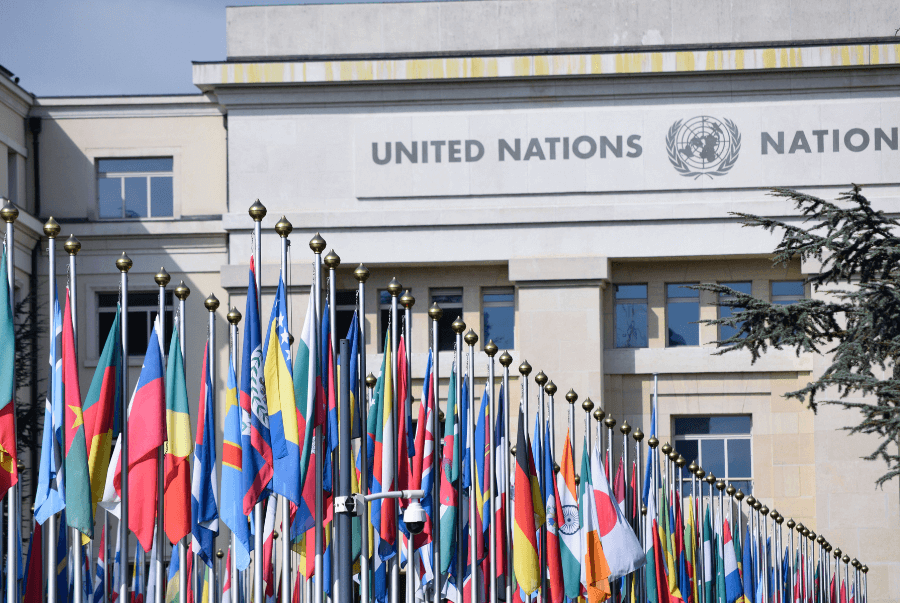
• 27 / 02 / 2019
Introduction
A bold initiative to create an international organization that would advance world peace, cooperation, and collective security arose in the wake of the devastating Second World War. Leading this initiative was the United States of America, which was instrumental in creating the model for the future United Nations (UN). In this investigation, we explore the incredible path that the United States of America forged toward the establishment of the United Nations, motivated by a dedication to international cooperation.
The Fallout from World War II: An Appeal for International Collaboration
Devastation and the Search for Perpetual Peace: Context After World War II, the world was engulfed in violence, with countries reeling from the devastating consequences of war.
Global Consciousness: The war's atrocities and immense devastation caused a widespread realization that a new international order was required.
The Conference on International Organization of the United Nations:
1945's San Francisco Conference:
Context: The idea of an international body tasked with averting future hostilities gained momentum, and in 1945 the United Nations Conference on International Organization was held in San Francisco.
American Leadership: The United States of America, led by President Franklin D. Roosevelt, was instrumental in the conference's arrangement and planning.
Creating the United Nations Charter:
Collaborative diplomacy: During the San Francisco Conference, representatives from fifty countries collaborated to draft the United Nations Charter.
Important Contributions: The United States of America, as exemplified by individuals such as Secretary of State Edward Stettinius Jr., was instrumental in forming the framework and guiding ideals of the charter.
The Significance of Crucial Persons:
Franklin D. Roosevelt, President:
Visionary Leadership: Prior to his death in 1945, President Roosevelt played a key role in defining the UN's mission.
Legacy: His idea for a cooperative international peacekeeping organization set the stage for later attempts to create the United Nations.
Harry S. Truman: Upholding the Dream
Immediate Successor: Following the demise of President Roosevelt, President Truman took office and proceeded with the UN's establishment.
UN Charter Signature: On June 26, 1945, Truman signed the UN Charter, securing the United States of America's dedication to a new era.
Important Ideas and U.S. Contributions:
Cooperation and Collective Security:
UN Charter Principles: The UN Charter reflected a dedication to cooperative efforts, collective security, and amicable dispute settlement.
US Dedication: The United States of America's adherence to these principles demonstrated its commitment to averting future international conflicts.
Economic and Social Development:
UN's Three Pillars: The UN Charter placed equal emphasis on social and economic development as well as global peace and security.
U.S. Contributions: In line with the larger objectives of the UN, the USA supports programs that address poverty, health, education, and human rights.
Repercussions and Legacy:
Reconstruction and Stability Following the War:
The Marshall Plan was one of the post-World War II American efforts to promote economic stability and aid in the reconstruction of war-torn countries.
The UN's Function: As a founding member of the UN, the USA served as a platform for organizing global efforts toward development and reconstruction.
Taking on Global Challenges:
Persistent Collaboration: The United States of America's continued membership in the United Nations is indicative of its dedication to tackling current worldwide issues, such as climate change, pandemics, and humanitarian emergencies.
Soft Power Diplomacy: The United Nations offers a platform for the United States of America to engage in cooperative diplomacy, collaborating with other countries to tackle common issues.
Conclusion
The United Nations was established as evidence of the nations' shared resolve to pave the way for enduring peace and collaboration. The USA was essential to the creation of this international institution because of its forward-thinking leaders and dedication to global cooperation. The United Nations, which represents the possibility of nations coming together to pursue a more peaceful and cooperative world, continues to be a ray of hope as we negotiate the complexity of the present and the future. The USA's crucial role in its founding is reflected throughout history, highlighting the ongoing significance of world peace and diplomacy.
Sign up at UNIPREP, your one-stop platform for global opportunities in education, business, career & life abroad.
Cookies help us evaluate website traffic and improve user experience.Your information will be aggregated with the data of all other users after you agree to our usage of cookies.
UNIABROAD LTD.
Suite 524, Citibase, The Atrium, 1 Harefield Rd, Uxbridge UB8 1EX, United Kingdom
UNIABROAD Technology Ltd.
165/1,Opp Brahmasthana Kalyana Mantapa, Sahukar Chenniah Road, TK Layout, Mysuru, Karnataka
Privacy Policy | Terms & Conditions | Disclaimer | Refund Policy

Privacy Policy | Terms & Conditions | Disclaimer | Refund Policy
2023 © All rights reserved by UNIABROAD LTD.